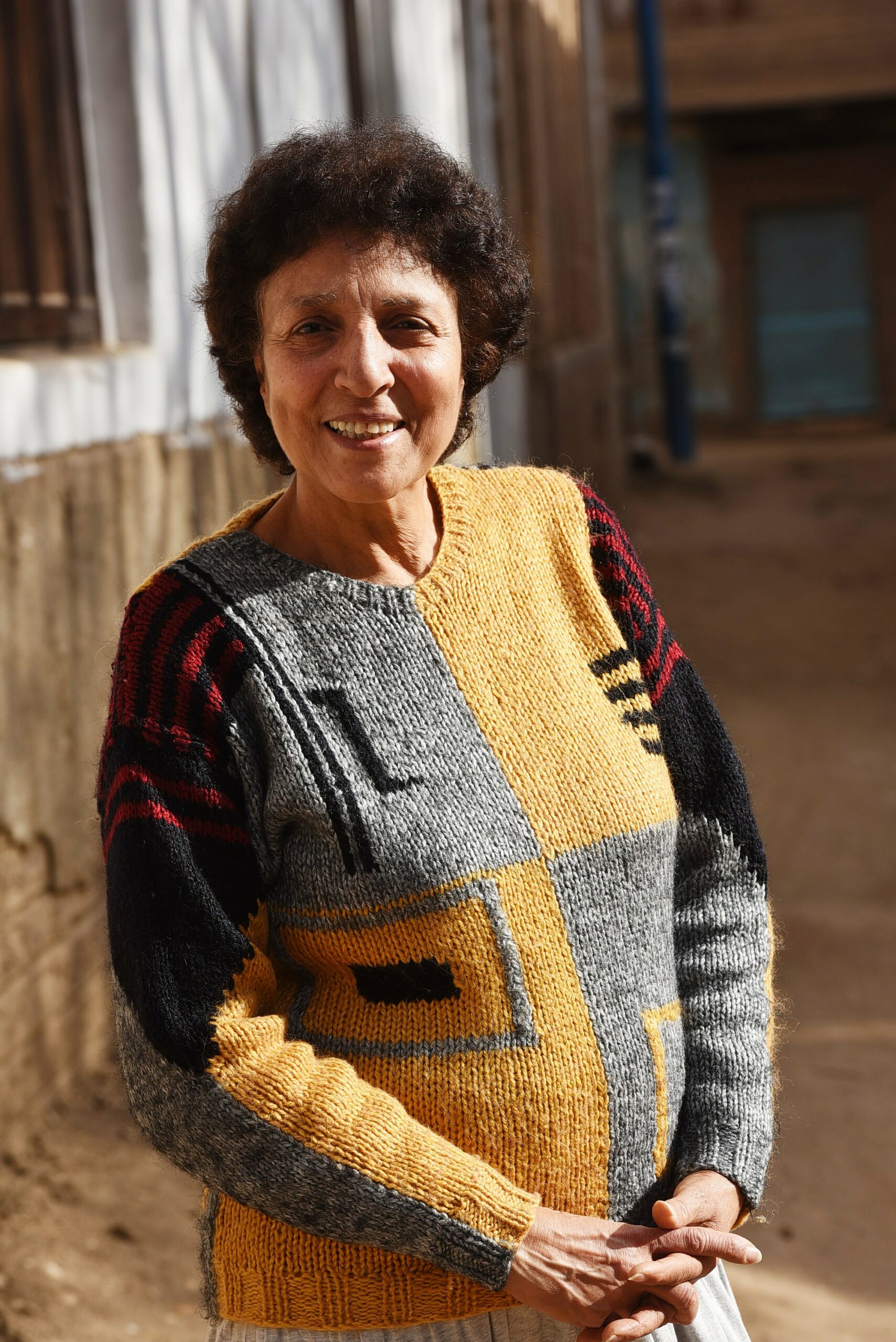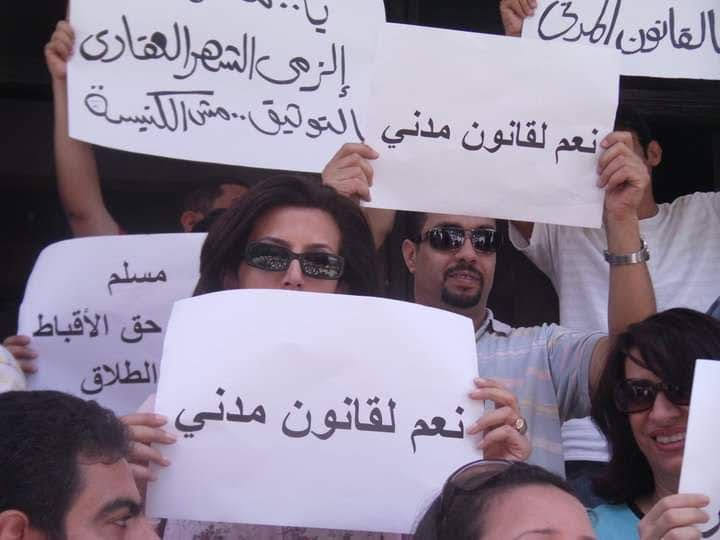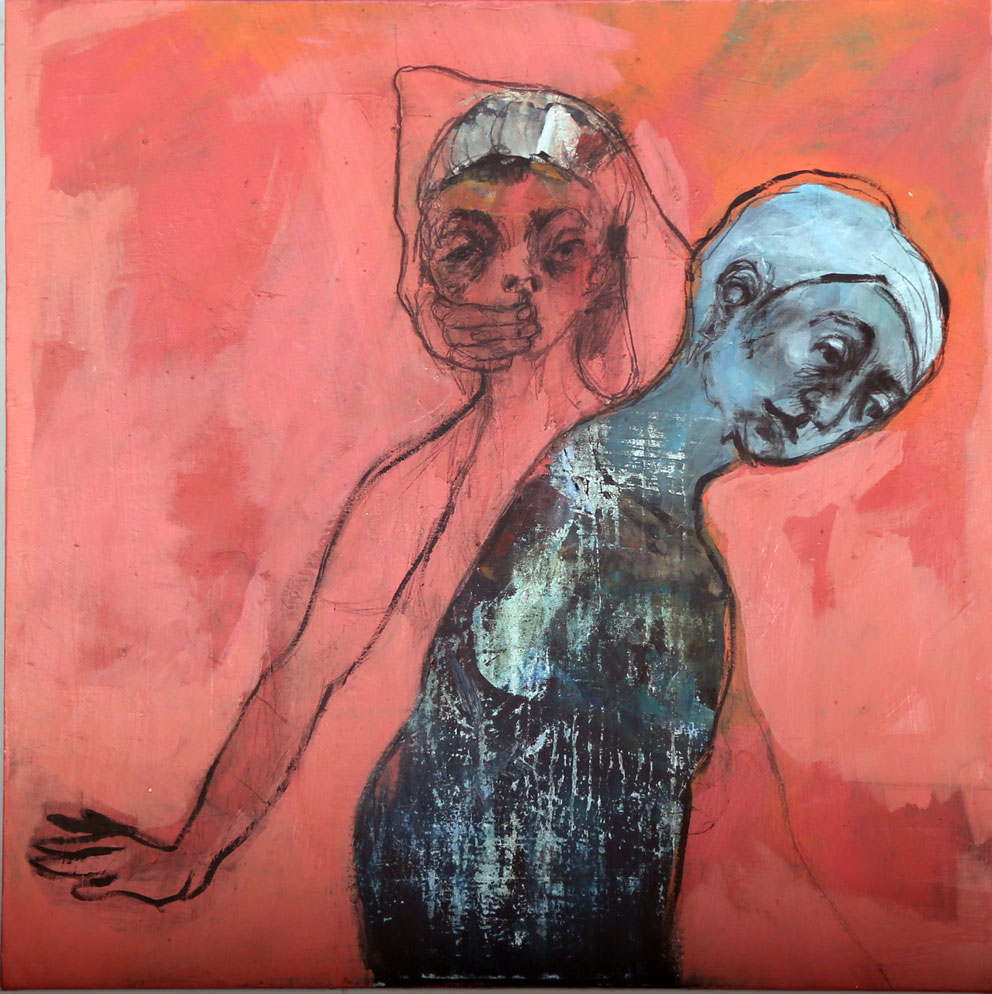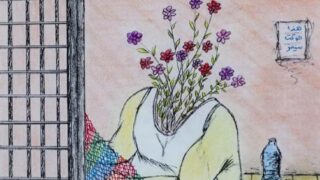
This publication has benefited from the support of the Rosa Luxemburg Foundation. This text may be reproduced in part or in full, provided the source is acknowledged.
I. Making history: Eva Habil, the first woman mayor in Egypt
Mayor Eva of Asyut is the first woman in Upper Egypt to be appointed mayor, to obtain her right to land inheritance, and to resolve her society’s problems in a way that adopts nonviolent conflict resolution to eliminate the custom of taking revenge. She happened to be a Christian in a Christian majority village; and while she left office in 2010, the community still calls her “Omda” (mayor)!

Ancient Egyptians were fascinated with nature. Golden wheat shafts were grown by river banks and were a source of pride for whomever grew them. Wheat was even associated with medicine and determining the sex of a foetus. A woman would pee in two bowls, one with wheat in it and another with barley. If the barley sprouted, the newborn would be determined as male, whereas if the wheat sprouted, the newborn would be female.
I remembered that story as the train coursed through the wheat fields along the way, crossing 380 km from Cairo to the historical Dairut in Asyut governorate, in central Upper Egypt.
Our ancestors have linked wheat with the female, and contemporary Egyptians have called it “Aysh” (Arabic for “Living”); the food that makes life. We crossed over to a village called “Komboha Bahri”, the centre for wheat agriculture in the governorate, where the most famous woman in Asyut is based. There, Mayor Eva Habil has managed to become the first lady who holds that position, installed almost two hundred years ago by Mohammad Ali Pasha into the local system of administration.
Eva’s experience of mayorship, which lasted from 2008 and until 2010, has been quite effective. It changed some inherited cultural and social concepts amidst a very closed off Upper Egypt rural community.
In the village of Komboha Bahri in Dairut’s centre (1), serenity abounds. The roads are quiet and the farmers go about diligently irrigating their lands. The church bells ring and the muazin’s voice is raised behind, in the village’s only mosque. According to official statistics, the village has a sweeping Christian majority, with a population of 8,762 (2), where Muslims make up no more than 2 percent of the overall population. The village has 11 churches, whether ancient or under construction, which represent the three main denominations (Orthodox Christians, Catholics, and Protestants), all of whom live in harmony away from sectarian or denominational disagreements, which characterise some of the Upper Egypt governorates.
Meeting the mayor
In the appended interview, Eva Habil introduces herself as a modern day Hatshepsut (3). Hailing from the heart of Upper Egypt, she administered the little Komboha community after becoming mayor. She has worked in public service since 1990, starting at the village’s local council, then becoming the only woman to work in the local administration of the Dairut Centre, the main administrative centre that the village subscribes to, by way of direct elections, where she reaped the highest number of votes in Upper Egypt at the time. In 2008, she was appointed the first woman mayor, a Christian, to fill that position. (4) Five men competed with her, including her brother, but former President Husni Mubarak’s regime felt that she was much more suited for and deserving of the position.
Eva was mayor from 2008 to 2010, when she resigned after she was appointed to the Egyptian Shura Council in 2010. She was able to change some of the inherited cultural and social concepts amidst a very closed off rural community, and perhaps one of the experiences that had greatly impacted the women of the village was Eva’s fight for her right to inheritance.
Women cannot inherit, but Eva did
Women in most places in Upper Egypt are still denied inheritance (5), for reasons to do with customs and traditions in a social milieu where women’s lives are led very conservatively – in accordance with a patriarchal system that women themselves have helped entrench throughout many generations.
Even though these customs violate Egyptian law, women’s inheritance in Upper Egypt, as legal experts call it, is an “unspoken commandment”. As per the Central Agency for Public Mobilization and Statistics, the courts look into 144 thousand cases of denied inheritance per year. 95 percent of women and girls are denied inheritance in both Qena and Sohaj governorates, for instance, which are the second largest governorates in Upper Egypt, following Asyut. Then, in Asyut itself, around 73 percent of women are denied inheritance. As inheritance claims have grown over the past decade, the Egyptian authorities have advised legislators to modify the inheritances law (6), in order to criminalize non-delivery of the inheritance to the entitled party, as per law no. 2019 (2017). Anyone who violates the law is sentenced to prison for no less than six months and is fined with no less than twenty thousand Egyptian pounds and no more one hundred thousand Egyptian pounds; and, anyone who deliberately denies a heritor their share of the inheritance would be punished with either of the former.
According to Eva, “Women are denied inheritance, be it land, real estate, assets, or commercial enterprises, as part of mistaken cultural and social legacies. By applying those, inheritance is believed to be kept intact and under the same family name, rather than go to a woman whose husband carries a different last name. This is an entrenched conviction for the men in Upper Egypt, whose land stands for their virtue and honour.”
The women with whom we’ve talked in Komboha Bahri, whether farmers or women who carry out house work, affirm that the village men deny women their inheritance. According to customs, the village’s 4,291 women -out of a village population of 8,762 according to this year’s most recent official statistics- aren’t entitled to their legitimate and legal shares.
Although the majority of women breed poultry and cattle at home at an extensive rate, the men see that these activities lie beyond the scope of “work”.
Women’s housework and small projects run from home are not considered work.
Eva’s presence in the village, however, has created some form of a social movement and destabilized the patriarchal system, ongoing since time immemorial. Women from the village were then able to raise their own banners: “I want my inheritance back”. However, none of them yet has received the right to inherit land. While one of them was perhaps able to obtain a share in her father’s house, it was given on the condition that she would have no right to sell it later. A number of younger women, who witnessed Eva’s mayorship, were able to apply a customary law called “The Radwa” (7), which replaced their right to claim land and immovable assets. They see it as a new accomplishment that they were able to secure for the little village through their own efforts and Eva’s.
Man’s workforce and women’s unemployment
Education rates reach more than 90 percent in a number of different educational fields. And yet, the village’s population do not seek any regulated public work. Ever since the 1960s, the village inhabitants have decided to establish poultry farms to generate revenues. The village contains more than 200 poultry farms and 150 hatching factories. The idea was developed with time so that the village would become, according to the definition of the Ministry of Local Development, a “productive village”. Its production even exceeded self-sufficiency, whereby the village would export the surplus to all Upper Egypt governorates. It would also be considered the best of investors among villages in small, medium, and microenterprises with poultry revenues, with more than 90 percent of poultry revenues seen among Upper Egypt governorates. It is also considered to be the first supplier of chicks in the governorate in the last twenty years.
In her conversation with the team of Assafir al-Arabi, Eva says that the village is now unemployment-free: everyone works – some in agriculture (the village owns only 300 feddans (acres) of arable land, and the farmed spaces are gradually growing smaller), and others in private businesses. A few of them work in public posts, while the majority works in poultry farming. Although the majority of women breed poultry and cattle at home at an extensive rate, the men see it as an activity that lies beyond the scope of “work”. In general, women’s housework and small projects run from home are not considered work. Only two women in the village work as physicians in the small health clinic, three as lawyers, and a small number of them work as teachers.
In the village of Komboha, reality begs for another question: Why do the male villagers fear that their inheritance would be lost for another family, although the village’s Christian families are all somehow related? Eva answers: “Upper Egypt customs have defeated religion. The men of Upper Egypt, whether Muslim or Christian, will remain one and the same. Religion here is a secondary matter.”
Ever since she was appointed mayor, Eva has tried to create some kind of equilibrium between women and men and to highlight the importance of work and for women to keep some money for themselves, separate from their male relatives. Her slogan was “I’m a woman and I can”. It was tough at the beginning, but the women’s spirits were lifted by seeing the mayor run her father’s mill by herself and found a small textile factory where some of the village women would work. Some women were inspired and wanted to create their own small projects as well.
No place for vengeance
Eva is proud that her village now is vengeance-free. According to her testimony, no revenge acts were taken during her mayorship. Following her resignation, though, there was one revenge incident about to take place following a fight between two members of the same family; she intervened, though, and put an end to the crisis. Ever since, no other revenge cases have come up at all. That was her way of resolving village problems, while keeping policemen at bay as long as possible.
Although she left her position in 2010, everyone still calls her “Omda”, “the mayor”; they resort to her in resolving their social and legal issues, while women reach out to her to help them out in questions of inheritance, work, and education. Everyone agrees that her pioneering experience has contributed to the transformation of some traditions and customs of a very closed off and private society, like the small Komboha community.
II. Christian Egyptian women fight to leave the prison of eternal marriage
There are several efforts lead by Christian Egyptian women to call for a civil law that would unchain them from everlasting bond of marriage enforced by the Coptic church on Christians. There are also many painful stories about individual women, their experiences, and the organizations that help them realise an end.

Christian women’s calls for a unified personal status law that unites both Muslims and non-Muslims have picked up, following perhaps thirty years of a standstill. They wish for the law to be their way out of the eternal marriage that the Coptic church enforces. While discussions are carried out between the Egyptian authorities and the church on the one hand,(1) and among the representatives of the Egyptian church themselves since 2014 on the other,(2) there have been several other unofficial battles running on the ground. Individually led in their majority, there have also been some attempts to pressure the church and lay out the crisis before the Egyptian public opinion, to mobilize it into calling out what has been hidden for decades, and to rebel against the ecclesiastical order.
According to lawyer and criminal law scholar Said Fayez, a list was issued for Orthodox Copts in 1938, where nine reasons for divorce are established (article 50-58). However, the crisis began during the papacy of Pope Shenouda III in 1971, who reduced the reasons for divorce into only one, which is “adultery”, referring as such to his own interpretation of a text in the Bible. He, therefore, delegitimized the remarriages of those divorced by the 1938 Doctrine, unless it were for adultery.
In 2008, through his legal advisors, the Pope managed to amend the older list, where it affirmed that “No divorce would be given unless justified by adultery.” According to Fayez, those harmed by the new doctrine would resort to a number of solutions at the time, most common of which would be to convert to another denomination, thus making use of a legal text in Egyptian law, which permits seeking national courts where the couple comes from two different denominations or sects.(3) Pope Shenouda, along with other heads of church, would then intervene and prohibit issuing such certificates to Orthodox Christians, and so the crisis deepened. Two solutions were thus left for the aggrieved to try: either resort to offices that broker a change of denomination in Egypt or abroad, or convert to Islam, to forever escape the church’s grip. This would create yet another bigger crisis, however – the crisis of “Christian returnees” following their divorce.
The growing social and political unrest leading up to and beyond the January 2011 revolution introduced the internet as a new space for social organization. Movements that sought change would use it promote their discourses and reach larger populations. The group would thus move into the street as an association named “Support Copts’ Right to Divorce.”
Fayez says that individuals, groups, and institutions have taken up other methods as well, through initiatives devised since before the 2011 revolution and until now. Important tools were used to pressure the church beyond its frameworks, but eventually, the head of the Coptic Council would play his own role in disintegrating such initiatives. He resorted to resolving some individual cases, one by one, thus dispersing the collective effort. (4)
Layla and Maria among others
Layla, an Egyptian Orthodox Copt, has been through an 8-year long battle to obtain a civil divorce that the church would recognize. She’s been through another war as well to obtain a permit to remarry. She says: “I’ve discovered that my husband was using our marriage to cover up his deceit and fraud. He was caught and imprisoned for 3 years. I reached out to the Cairo cathedral to file for divorce with the clerical council, but the priest in charge there told me that my husband was Christian and so I had to put up with him”. Following attempts that lasted for 3 years, and the establishment of many committees that would reconcile the couple, she reached out to the national court of justice to obtain a proof of alimony, to use as evidence of the couple’s separation for 3 years due to the husband’s imprisonment, which could support her case before the church committee.
“Nakad”: that sly trick to silence women
01-01-2022
Indeed, Layla provided the church with proof of separation and the husband’s imprisonment, but the church wouldn’t issue a decision. Layla would finally resort to obtaining divorce through the legal system itself. Since the law refers divorce cases to for the litigators’ religious court of justice whenever they’re affiliated with the same denomination, Layla circumvented the system by attaining a change of sect certificate (in return for 75 thousand Egyptian pounds at the time), and frequented court hallways for four years in order to finally get a pronouncement of divorce. A year and a half after it was issued, Layla managed to obtain the church’s recognition of the divorce and thus a permit to remarry.
When Pope Shenouda III became the Coptic pope in 1971, he reduced the reasons for divorce into one, which is “adultery”, referring as such to his own interpretation of a text in the Bible. He, therefore, delegitimized remarriage for those divorced by order of the 1938 Doctrine, unless it were for adultery.
While Layla was able to remain Christian by simply changing her denomination, Maria, a Catholic, couldn’t take it any longer. She couldn’t afford a certificate to change her sect. And although her case was quite terrible – her husband had left her for the United States, leaving her behind with a little girl – the church wouldn’t grant her a divorce. Layla finally resorted to converting to Islam, as a radical way out of her five-year crisis. Once converted, she got a divorce ruling right away and, years later, she remarried and immigrated with her husband abroad.(5)
Feminist initiatives
The growing social and political unrest leading up to and beyond the January 2011 revolution introduced the internet as a new space for social organization. Movements that sought change would use it promote their discourses and reach larger populations. This resonated well among the Christian feminist groups in specific,(6) who have been organizing for two and a half decades. A Facebook page was thus created by a Christian activist called Amira Gamal, who called for the Christians’ right to divorce and remarry. That was in 2010, after which the group took its struggle to the streets through the association “Support Copts’ Right to Divorce”. The association is run by women, alongside some aggrieved men. The second framework resorted to would be The Center for Egyptian Women's Legal Assistance (CEWLA), founded in the 1990s by human rights lawyer Azza Soliman.
• Support Copts’ Right to Divorce
In May 2010, Majdi William, artist Hala Sidqi’s divorcé, obtained a ruling from the national court that obligated the church to issue him a permit to remarry. The ruling unfolded in a clash between the church and the State, whereby the presidential institution had to intervene to discuss a unified personal status law for Christians. During the discussions, unpublicized at the time, an association called “Support Copts’ right to Divorce and Civil Marriage” emerged. It was the first Christian grassroots movement to tackle the divorce crisis in churches. They protested in front of the Ministry of Justice, raising banners that called for the church to legitimize divorce and remarriage for aggrieved Copts’, and to reinstate the Doctrine of 1938, which had sanctioned nine reasons that justified divorce.
A rally was then organized before the Egyptian Council of Ministers in August 2010. Later, a press conference was held for the association to introduce its vision and objectives at the Hisham Mubarak Law Centre – “Does Christianity have a heart big enough for civil code?” The golden opportunity appeared before the association, according to its coordinator, Amira Gamal, after the State began to discuss a possible personal status law in December 2010.
The Center for Egyptian Women's Legal Assistance (CEWLA) began working on Christian women’s cases in Egypt in 1997, when Christian women resorted to the foundation to save them from their husbands. The latter had conspired to quit their marriage in a religiously sanctioned manner by accusing their wives of adultery.
In July 2011, the association began to take a stand against the church. It also held a press conference to respond to Sawiris’ accusations against those church members who converted away from Christianity. The founder and spokeswoman at the time, Amira Gamal, said then that she and her colleagues “continue to call for the right to divorce, and the church is charging us with heresy for the mere wish to obtain that right. We demand that the State give us the right to civil divorce; we are Egyptians after all, and not all our affairs should be left to the church.”
The association’s members have also protested against the clerical council, collaborating with other groups that would be later called the 1938 Copts. Then, in August 2012, the association invited those harmed by the personal status law to perform their prayers in front of the presidential palace. Their demands were met with the support of a number of human rights organizations at the time, but the association would gradually disappear from public views afterwards.
• The Center for Egyptian Women's Legal Assistance
Founded by lawyer Azza Soliman, CEWLA (7) has taken up the task of spreading legal awareness among women, especially in impoverished areas and among religious minorities. The foundation works on 3 main agendas: fighting violence against women and calling for justice, developing local communities, and joining efforts with international campaigns to call for amending laws. The foundation began working on Christian women’s cases in Egypt in 1997, where Priest Ibrahim Abdel Sayid (8) took up training women who worked at the foundation to tackle personal status issues for Christians as well as any related Christian orders. The foundation would later publish an analysis in 2001, titled “Two years into divorce”, to call for reactivating the 1938 Doctrine, which Pope Shenouda had overruled. Some Christian women resorted to the foundation to help save them from their husbands, who had conspired to quit the marriage in a religiously sanctioned manner by accusing their wives of adultery. Azza Soliman says: “We’ve since helped many women to obtain divorce rulings against their husbands and offered them legal support.”
In collaboration with Dr Nadia Halim (9) and Priest Ikram Lamie,(10) the foundation proposed writing related doctoral theses, which helped the foundation infiltrate the church and was thus allowed to introduce ideas and open social discussions around divorce cases and the 1938 Doctrine. Its attempts have even drawn in the Orthodox church in 2008, when Pope Shenouda’s deputy, Anbaa Bishoy, attended one of the foundation’s conferences and announced, for the first time, that the church was about to issue a new personal status law doctrine.
“We have collaborated with a number of Christian initiatives and held many round tables with the church to help support the Christians’ right to a fair personal status law. We’ve also proposed a more just personal status bill in 2003 and led discussions and initiatives over the course of many years with the three Christian sects in order to draft a proposal of a unified personal status bill”, Azza Soliman added.
Although the founders of the “Support Copts’ Right to Divorce” have disappeared after 2012, their civil actions have created a state of controversy, (11) from which a movement within the church community itself was born, even if limited at the time. The most effective of these, however, has been the New Woman Foundation, which has appealed to the State, Church, and society altogether, with initiatives of great impact. They did so either by helping Christian women themselves or thanks to the social conversation that they created, which tackled the long-awaited law as well as other numerous cases that concern Christian women in Egypt.
The content of this publication is the sole responsibility of Assafir Al-Arabi and Rosa Luxemburg Foundation cannot accept any liability for it.
Translated from Arabic by Yasmine Haj
Published in Assafir Al-Arabi on 24/03/2022
1- Affiliated with Dairut Al-Sharif, which is one of its most famous areas, also called Tairut Sarabam in Coptic, which means a “dense tree” or a “nursing mother”. Arabs transliterated it into Dairut.
2- Many villagers have migrated to the United States, and large groups work in the State of Kuwait, and so they’re not included in the official census – which only represents the number of residing inhabitants.
3- A queen and the most famous female Pharaonic ruler (1508 BC.). She challenged the royal court and priests who had never allowed for a woman to be ordained as a ruler.
4- Egyptian mayors are appointed by nomination and by submitting the relevant documents to the concerned entities; then, the Minister of Interior elects someone from among the nominees and appoints them as mayor.
5- As per the people who filed inheritance claims to the court, male siblings are usually behind 50 percent of inheritance denials, obstinate mothers who refuse that their daughters obtain their right to inheritance are behind 25 percent of those cases, while fathers, who, while still alive, write off everything they own to their male sons, are behind the remaining 25 percent of those cases.
6- For more about the law, see the following link: https://bit.ly/3NdNCcJ.
7- A social custom created by some of the Upper Egypt governorates, which states that male inheritors may provide a certain amount of money to female inheritors if the latter gave up their right to inheritance, which is usually an amount much smaller than the actual value of their inheritance.
1- The Egyptian Church Council includes five churches: The Orthodox church, the Catholic church, the Anglican church, the Greek Orthodox church, and the Episcopalian church.
2- News have been leaked that the bill has now reached the Egyptian State Council for discussion and approval, and that it might be ratified soon.
3- Article 17 of Law no. 1 (2000), which concerns the personal status law, states that “No divorce case shall be accepted if a couple is of the same sect and denomination, unless their own religious laws allowed it”. Which means that, in case one of the two parties had a different denomination, such as Islam, even at a date posterior to the marriage contract, Islamic Sharia laws shall be applied.
4- There was a small respite with the rise of Pope Tawadros II. Discussions around the Christian Family Code had started in 2014, and one of the main priorities was divorce and remarriage. The law has been discussed since among the churches, but has yet to be ratified.
5- Pseudonyms were used to respect both women’s wishes.
6- Article 3 of the Egyptian Constitution came up, which was first appended in 2012. Some of the feminist activists protested against it and saw that, through it, the church has ordained itself the be-all and end-all in Christian personal status affairs, including divorce and marriage.
7- An NGO established in 1995 in the Boulaq District, categorized as one of the shantytowns of Cairo.
8- Known as the reform priest within the Coptic church, he presided over Mar Girgis Church in the Maadi Gardens in Cairo.
9- A professor of social sciences at the National Centre for Social Research.
10- Spokesperson of the Anglican church and a professor of religious sciences.
11- Initiatives and movements led by men, mostly aggrieved by the personal status law, have emerged, but most did not last – either due to the limited number of its members or to the secret deals concluded with the church, which promised to grant them divorce or permit their remarriage in exchange for giving up their views and keeping silent.






